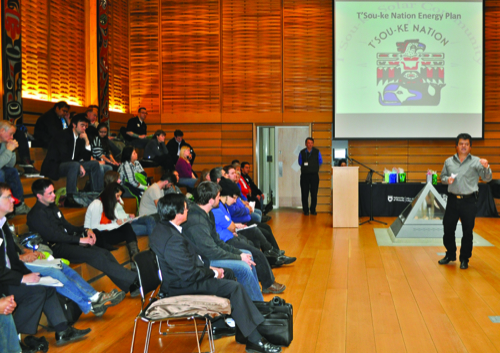Governance powers T’Sou-ke future
“Good governance is key,”says Chief Gordon Planes when he talks about his nation’s never-ending journey for sustainability… and survival. “We all must have light footprint on Mother Earth.”
It is a message that T’Sou-ke First Nation has been spreading to other nations and communities across Canada since it completed its massive solar power project in the summer of 2009. And it is one that is becoming increasingly important as climate changes while energy and food sources become questionable.
“We are preparing ourselves through strong governance and asserting our Douglas Treaty rights,” he said. “We are always evolving, because we have to. And we will keep on this path because we have good governance, no matter who the leader of our nation is.”
Chief Planes spoke to The Sentinel before he left for a climate action conference in Edmonton at the end of January. He is no stranger to speaking, listening and discussing the future. The evolving story of T’Sou-ke is well received, whether at big-wig conferences in cities or around the table with Coast Salish neighbours from the Salish Sea.
“I think that if you’re well prepared in governance, you will be able to do a lot of things in your community that will help us all,” he said. “Checks and balances need to be in place and there has to be good fiscal management.”
He said that some nations move towards self-governance through treaty to quickly, exhibiting un-organization rather than good organization. “You’ve gotta walk before you run. That’s why T’Sou-ke has clout with all levels of government. People listen to us because we have a lot of years of good practices.”
In Edmonton he spoke not only about food, water and energy security, but also about new initiatives at his nation through partnerships in tidal power or micro-grid technology.
“It is consistent with our longhouse ideals,” he said of spreading the message. “We are giving this information away free of charge to show how sustainability can be achieved once again, using the power of the sun, wind and sea.”
For years now, people have been showing up at T’Sou-ke wanting to know more about the solar project. Government ministers, First Nation leaders and visitors from throughout North America are coming by the busload. Some arrive in electric vehicles and take advantage of the charging station, powered by solar, of course, outside the administration offices.
“We use everything we do as an educational tool to get the message out, Chief Planes said.
When T’Sou-ke was awarded the Solar Community of the Year award four years ago, it became widely known as the as the most solar-intensive community in Canada. In that role, it has been spreading its sustainability message.
“Eventually everyone will be forced to do this,” Chief Planes said. “We didn’t want to wait until we were forced.”
Several years ago the small school at T’Sou-ke First Nation entered a gingerbread house competition that open to all elementary schools in the Sooke region. The children, being from a solar-friendly community, automatically put solar panels on the roof of the gingerbread ‘longhouse’ as they had only ever seen houses with the panels on their reserve and naturally assumed everyone else had them. They won the competition!





